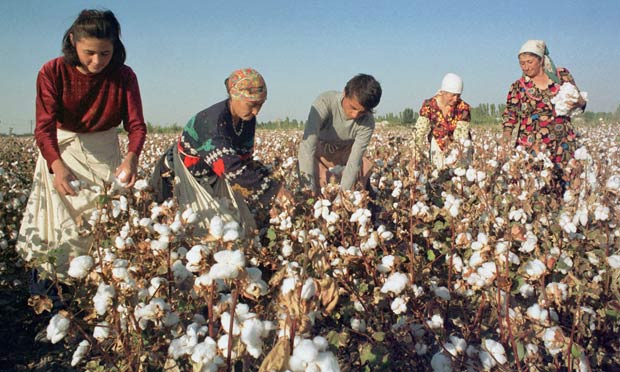Despite the general assumption that with international institutions comes enforced human rights regulation, forced labour today is alive and well. References to cotton fields, compulsory service, limited to no compensation, and compelled work quotas, are frequently associated with American slavery, abolished during the mid-19th century. Few are aware of the current cotton industry in Uzbekistan, and its connection to mass civil rights abuses, with conditions which mirror many elements of the barbarous and savage character of the old American plantation system.
The closed-off nature of the Uzbek government has enabled the state to engage in horrific exploitations of its citizens, while successfully preventing the international community from adequately documenting and investigating such atrocities. Even more shocking, are the lack of mainstream media coverage and apathetic response of the West, which so commonly condemns foreign neglect of basic human rights, but has devoted little attention to the abuses being carried out in Central Asia.
The cotton industry in Uzbekistan should be scrutinized by an international body on the grounds that it creates environmental catastrophes, economic pitfalls, and vast human rights violations.
Environment Catastrophes
The current cotton industry in Uzbekistan accounts for roughly $1 billion of the country’s annually revenue, making the state the fifth largest cotton producer in the world. More commonly associated with questionable working conditions, the cultivation of cotton fields in Uzbekistan is rarely criticized for its harmful effects on the environment, yet the link between cotton growth and water shortages should be of great concern to the international community. The cotton industry is one of the most environmentally unsustainable means of production.

An extremely thirsty plant, cotton requires about 700-13000 mm (or 27-51 inches) of water to grow. Roughly 20,000 liters of water is required to produce only 1kg of cotton (equivalent to a single T-shirt). Evidence of how harmful cotton production can be on the environment is no more apparent than in the Aral Sea, between Uzbekistan and Kazakhstan, stretching over 26,000 square miles. Once home to a thriving ecosystem, today the Aral Sea is nothing more than a dry, desertlike wasteland.
A vast, and highly inefficient irrigation network, originally created under the Soviet era in the 1960s, but which remains in use today, accounts for the disappearance of the Aral Sea’s body of fresh water. According to the World Bank, cotton fields in Uzbekistan drain 20km3 of water every year. Today, the Aral Sea is 15% of its original size.
Not only has the destruction of the Aral Sea ruined the region’s ecosystem, accounted for thousands of lost jobs, and deprived the population of a fresh source of drinkable water, but it has also created a series of harmful toxins, further damaging the environment and creating health concerns for local inhabitants. The soil is currently covered in toxic salts and pesticides, which are easily dispersed by wind storms, and thus spread throughout farm lands and account for respiratory illnesses and various forms of cancers.
Economic Concerns
The cultivation of cotton requires a huge amount of manpower, a challenge which the Uzbek government has overcome through its implementation of compulsory cotton picking. All members of society are expected to contribute to the cotton industry, and as a result, between September and November, workers from the public and private sectors come to the fields in truckloads, and devote entire months picking cotton, to meet the government’s quotas.

This creates vast economic hardships for the local population, since teachers, businessmen, doctors, and office workers spend a large portion of their time in the fields, rather than contributing to their society’s active workforce. Schools close their doors, businesses shut down, and hospitals become backlogged. Since the quotas extend to the country’s youth, a large portion of the population is forced to work in the fields, rather than study in a school, which means that many living in Uzbekistan do not obtain a substantial level of education. Not only are these conditions unethical, but they force the country’s public and private sectors to come to a grinding halt.
Human Rights Violations
Of all the criticisms directed towards Uzbekistan’s cotton production, the most concerning is a blatant disregard for basic human rights. Working on the cotton fields is compulsory, but compensation is not provided to workers. Those who defy, question, or refuse the government’s decision are at risk of losing their jobs and face physical abuse or imprisonment. All workers are expected to meet standardized quotas, roughly 120 pounds of cotton a day.

According to Human Rights Watch, the Uzbek government is guilty of not providing adequate living conditions for those forced to sleep in temporary housing facilities. Such facilities do not meet proper sanitary standards, resulting in workers’ contracting illnesses and spreading diseases. Activists and journalists who speak up against the system are immediately arrested. Furthermore, Uzbekistan has made it nearly impossible for international monitors to report on the situation, making it increasingly difficult for the global community to fully comprehend the extent of abuse taking place.
Forced labour in Uzbekistan is as unethical and as amoral as the former American slave industry, and the country must be held accountable. Just because universal norms and declarations have been established to outline respectable human rights regulations, it does not mean that the entire international community will automatically stop their indecent practices, especially if such practices are a source of valuable economic revenue. The international community needs to take a united stand against the way Uzbekistan’s country’s cotton industry creates drastic environmental concerns, cross-national economic pitfalls, and abhorrent human right abuses. Hannah Styffe




